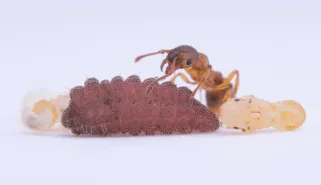The Sonoran Desert toad can alter your mind — it’s not the only animal
Psychedelic and other potentially mind-bending compounds show up on land and by sea

Some of the compounds made by these animals remain largely mysterious.
BACKGROUND: PREMYUDA YOSPIM/ISTOCK/GETTY IMAGES PLUS; ANIMALS, FROM LEFT: SMITHSONIAN TROPICAL RESEARCH INSTITUTE; © BEASTMASTER/INATURALIST (CC BY-NC 4.0); HOLGER KRISP/WIKIMEDIA COMMONS (CC BY 3.0); © MATT REALA/INATURALIST (CC BY-NC 4.0); BRIAN GRATWICKE/FLICKR (CC BY 2.0)
The adage “all attention is good attention” may be true for marketers — not so for the Sonoran Desert toad. Last fall, the U.S. National Park Service sent out a message on Facebook asking visitors to “refrain from licking” the toad (technically Incilius alvarius but commonly called Bufo alvarius). That message came months after a New York Times article covered the booming interest in the psychedelic compound that the toad excretes from its skin — along with the “poaching, over-harvesting and illegal trafficking” that have accompanied that interest.
People don’t typically lick the toads to get high, says Robert Villa, a community outreach specialist at the University of Arizona’s Desert Laboratory on Tumamoc Hill. The secretions the toads produce are toxic when ingested. They “work orally, through the mucous membranes, and cause really dangerous side effects, like cardiac arrest,” Villa says.
Instead, for decades, people have been collecting the secretions, then drying and smoking them. When inhaled, a compound within, 5-MeO-DMT, can cause auditory and visual hallucinations. “It’s a very powerful psychedelic sometimes called the ‘God molecule,’ ” says pharmacologist and chemist David Nichols of Purdue University in West Lafayette, Ind.
The drug’s growing popularity could be bad news for toad populations. “If you relocate it outside of its home territory,” Villa says, which often happens when people collect a toad for its secretions, “it gets lost and its chances for survival go way down.” What’s more, collecting large numbers of toads increases the risk of disease transmission, like chytrid fungus, between toads.
We at Science News heard the PSA loud and clear: Just leave this toad alone. But we couldn’t help but wonder: What other amazing animals may have psychedelic potential? Join us on a tour, by land and sea, of some of the world’s mind-altering fauna.
Sonoran Desert toad (Incilius alvarius)
Habitat: The Sonoran Desert, in the southwestern United States and northern Mexico
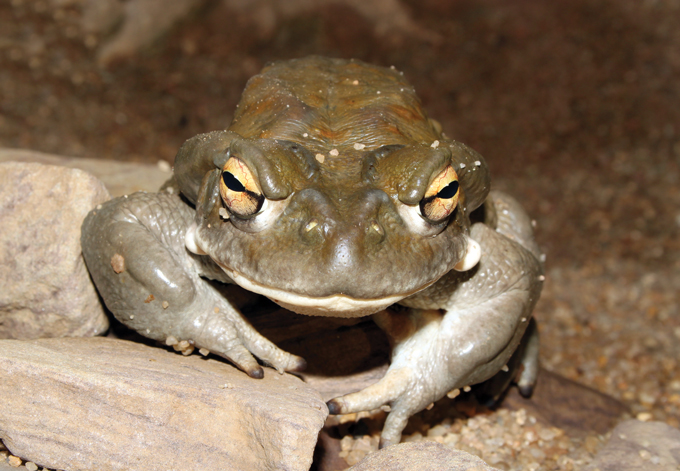
All toads secrete toxins from their skin. These secretions, whose specific compounds vary from species to species, probably evolved as a way to keep a toad’s body moist. Over time, the compounds, which can also act on the brain and affect heart muscle when ingested, came to aid in self-defense.
But the Sonoran Desert toad, also known as the Colorado River toad, appears to have taken evolution one step further.
The toad, one of the largest in North America, secretes an enzyme that converts bufotenine, a compound also made by other toads, into 5-MeO-DMT, a powerful hallucinogen related to the psychedelic drug DMT.
A frightened Sonoran Desert toad gushes its toxic mix, which includes 5-MeO-DMT, from its parotoid glands — located behind each eye — and from glands on its legs. It’s a way to say, “Please don’t eat me! I don’t taste good!” When swallowed in large quantities by a potential predator, the toxins can cause coma, cardiac arrest and even death.
Scientists aren’t yet sure why the Sonoran Desert toad produces 5-MeO-DMT, and why it is the only toad known to make it. “There’s a lot of mystery,” Villa says.
Giant monkey frog (Phyllomedusa bicolor)
Habitat: The Amazon Basin in South America
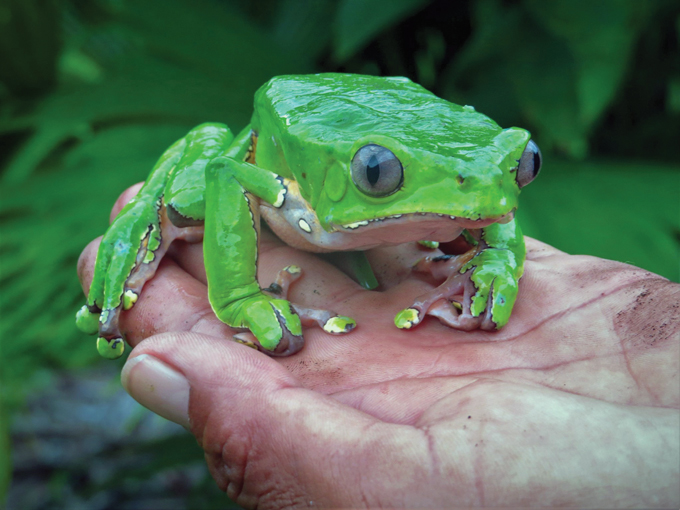
There’s no scientific consensus on whether kambô, the name for the toxic secretion produced by the giant monkey frog, should be considered a psychedelic. The term psychedelic comes from Greek meaning “mind manifesting,” Nichols says. “You can imagine, it’s enhancing the properties of your mind, rather than just intoxicating you.” Other compounds such as stimulants and depressants modify the activity of the brain, but they don’t leave users with the kind of new insights and memorable experiences that come with psychedelics.
Wuelton Monteiro, a tropical medicine researcher at the Universidade do Estado do Amazonas in Manaus, Brazil, points to a 2020 study in Scientific Reports as an example of why the classification has been unclear. In the small study, nearly half of participants who reported using kambô said they had a spiritual experience, and some experiences came with what resembled the afterglow often associated with hallucinogens. But kambô doesn’t activate the 5-HT2A receptor, a protein that senses the chemical messenger serotonin, while classic psychedelics do.
Among Indigenous populations in the southwestern Amazon, the frog’s skin secretions have been used for centuries as a stimulant in shamanistic rituals. According to Villa, the secretions are usually applied on small, superficial burns on the body to increase the stamina of hunters.
In predators attempting to gobble the frog, kambô might cause regurgitation, seizures and a change in heart function. Researchers are still trying to decipher the specific compounds that explain these effects, but they do know that species of Phyllomedusa collectively produce over 200 short protein fragments that can influence body function. Some might be promising for future medicines.
California harvester ant (Pogonomyrmex californicus)
Habitat: Southwestern United States and northern Mexico
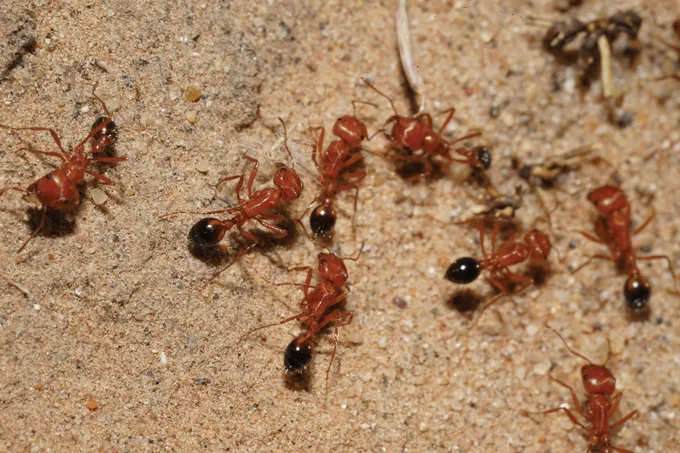
The venom of the California harvester ant is made up of enzymes that aren’t known to cause hallucinations on their own, but the Indigenous peoples of central California once ate them during rituals including vision quests. Ethnographic reports suggest people would swallow hundreds of live ants in balls of eagle down feathers. No doubt the people were stung, likely on the insides.
Justin Schmidt, an entomologist at the Southwestern Biological Institute and University of Arizona in Tucson who died in February, said the pain of being stung by so many ants, along with extreme cold, fasting and in some cases sleep deprivation, triggered hallucinations that connected the people with spiritual guides.
A harvester ant’s sting is “nothing like a bee sting,” Schmidt wrote in The Sting of the Wild (SN: 8/6/16, p. 26). “The pain is intense, comes in waves, and is deeply visceral.” Lasting from four to eight hours, the pain is accompanied by a numb sensation at the site of the sting. The ants deliver stings to defend their colonies from large predators, including lizards, birds and people. (Smaller enemies such as other insects and spiders are bitten.)
A person who eats 1,000 ants would probably die; according to Schmidt’s book, one ant is enough to kill a mouse. But some predators have defenses: The regal horned lizard (Phrynosoma solare) has a mucus lining its mouth and digestive system that allows it to eat hundreds of ants and a substance in its blood that neutralizes the venom. Some birds somehow avoid getting stung too.
It’s hard to get more information on how the ants were used in rituals and the nature of the experience. Disease and violence that came with Westerners during California’s gold rush destroyed the Indigenous communities in the Central Valley and their way of life.
Salema (Sarpa salpa)
Habitat: Temperate and tropical ocean waters, from the Atlantic coast of Africa to the Mediterranean Sea
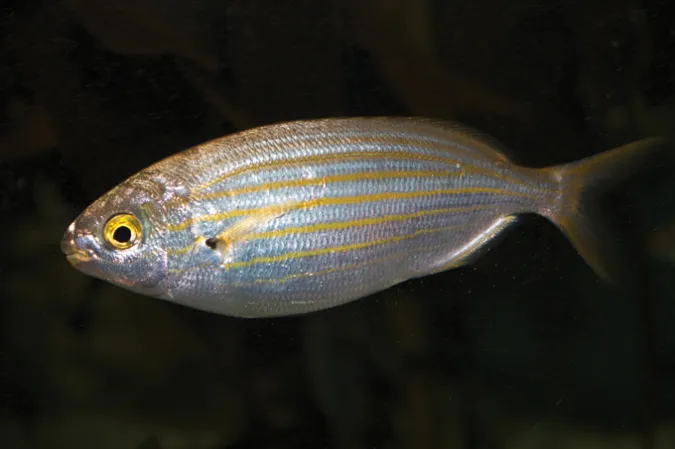
Fishes including this species of sea bream, as well as some sea chubs and clownfish, can cause auditory and visual hallucinations when eaten, though reports are rare. Sarpa salpa was known as the “dream fish” in ancient Rome, according to a 2018 review of psychedelic fauna published in Frontiers in Psychiatry. Two cases of hallucinatory fish poisoning were documented in 2006 in the journal Clinical Toxicology. In one case, a 40-year-old man ate baked S. salpa and later experienced hallucinations of screaming animals and giant arthropods surrounding his car. The symptoms went away, with medical attention, 36 hours after he ate the fish.
Researchers don’t know what compounds cause this ichthyoallyeinotoxism, or fish poisoning, which can include nightmares. Evolutionary biologist Leo Smith of the University of Kansas in Lawrence, who studies fish history and diversification, says he and other scientists suspect that the compounds are a by-product of the fishes’ diets.
But ichthyoallyeinotoxism is distinct from two other forms of fish poisoning. Symbiotic bacteria within puffer fish produce a neurotoxin called tetrodotoxin, or TTX, that can cause paralysis and death. And ciguatera fish poisoning comes from eating fish contaminated with a neurotoxin produced by some dinoflagellates. It can cause diarrhea, vomiting and weakness, as well as a reverse sensory disruption, where hot things seem cold and vice versa. But it does not cause hallucinations, says Sandric Leong, a biological oceanographer at the National University of Singapore.
How and why many of these neurotoxins are produced is still being worked out. “There are so many relationships with the marine environment which we are not very sure of,” Leong says.
Pitted sponge (Verongula rigida)
Habitat: The Caribbean
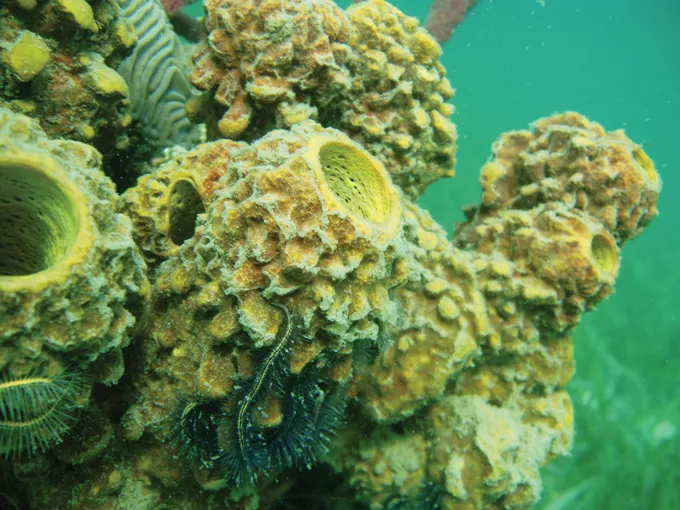
The pitted sponge and some other sponges including Smenospongia aura and S. echina contain 5-bromo-DMT and 5,6-dibromo-DMT. Because of their relationship with the psychedelic drug DMT, these compounds are plausible psychedelics. American chemist Alexander Shulgin, famous for his research into psychedelic compounds and for introducing the world to the synthetic hallucinogen MDMA, or ecstasy, and his wife Ann Shulgin wrote in TIHKAL: The Continuation that they don’t know whether the sponge compounds are activated by smoking or not. They are, however, “quantitatively reduced to DMT by stirring under hydrogen in methanol, in the presence of palladium on charcoal.”
The pitted sponge is known to concentrate in its tissue chemicals called monoamines that can modify the behavior of nerve cells. Not only can these compounds make the sponge taste bitter, but they can also alter the behavior of predatory fish that dine on the sponge.
“They wouldn’t prevent the fish from ever trying to take a bite, but it would prevent it from persisting or consuming the sponge any beyond an initial several bites,” says Mark Hamann, a pharmacologist from the Medical University of South Carolina in Charleston.
V. rigida’s ability to alter animal behavior intrigued Hamann, who reported in a 2008 study in the Journal of Natural Products that 5,6-dibromo-DMT acted like an antidepressant in rats, while 5-bromo-DMT acted like a sedative. Hamann says that related compounds may one day be isolated and might make for promising antidepressants, anxiety-reducing drugs or pain relievers in people.

